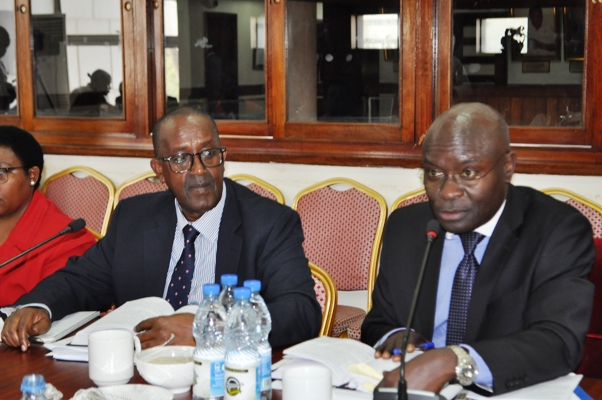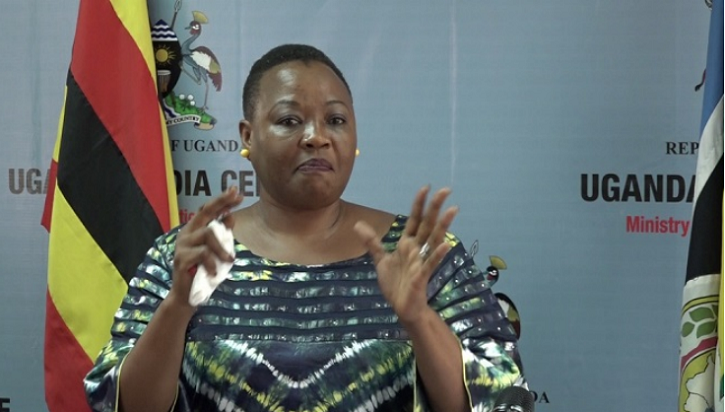The Health Ministry has trashed reports started by Kampala Lawmaker Muhammed Nsereko on the cost of COVID-19 tests.
According to a statement issued on Friday by the Permanent Secretary of the Ministry of Health, Dr Diana Atwine, Nsereko’s utterances amount to fake news.
“Attention has been drawn to a video currently circulating on social media where Kampala Central Member of Parliament, Hon. Muhammad Nsereko made what I will not term as malicious but uninformed false allegations on the cost of COVID-19 testing in the country,” the statement says.
Nsereko had been telling all and sundry that Ministry of Health is using Rapid Diagnostic Kits (RDTs) purchased at a cost of $65 hence causing financial loss of billions of shillings as opposed to the exact price of USD 3.3$ on open market.
Atwine’s statement adds, “…the Ministry of Health calls upon the public to be vigilant in order to avoid being fleeced by unscrupulous individuals. Anyone who intends to import any new test kits for COVID-19 must undergo the well-laid down procedures of validation and certification. We urge the legislator to desist from making baseless, malicious, diversionary, and un researched allegations which puts him in a bad light as mere politicking.”
Diana goes ahead to explain why there appear to be disparities in costs of the test.
BELOW IS THE FULL STATEMENT
Attention has been drawn to a video currently circulating on social media where Kampala Central Member of Parliament, Hon. Muhammad Nsereko made what I will not term as malicious but uninformed false allegations on the cost of COVID-19 testing in the country. The Legislator alleged that;
I. The Ministry of Health is using Rapid Diagnostic Kits (RDTs) purchased at a cost of $65 hence causing financial loss of billions of shillings as opposed to the exact price of USD 3.3$ on open market.
The Ministry of Health would like to clarify as follows;
There are 3 types of tests available for COVID-19;
i. Rapid Diagnostics Tests (RDT) which are either antibody or antigen. The antibody test is not singularly used for diagnosis because of the following reasons;
a) People who could be infected with COVID-19 and not produced antibodies will present a false negative test. This means that while they may be infected, when tested with an RDT only, they will receive a negative test result.
b) Depending on the stage of testing, if it comes later in the infection phase, the rapid test would be able to pick the antibodies after the person has healed.
Therefore, it cannot be used for diagnostic purposes because of the above reasons. Antibody tests are only used in surveillance and research as a means to explain the level of exposure of the population. The current antibody-testing world over is done in conjunction with other testing protocols. The RDT purchased by the Ministry of Health for survey purposes, although certified by WHO, is still under validation as per in country protocols and the World Health Organization (WHO) guidelines. This RDT costs USD 5$ including the airlifting costs. It is therefore untrue to say that Ministry of Health bought RDTs at USD 65$.
ii. Antigen tests: This is a rapid test that picks the outer particles of the virus. The Ministry of Health has procured each antigen test kit at USD 25. This test is more reliable as it picks the actual virus particles and results can be obtained within a short time. However, the antigen tests are not easily available globally and this explains the high cost due to increased demand.
iii. Polymerase Chain Reaction (PCR) Tests: This constitutes lengthy and multiple processes. One single PCR test is carried out in three stages and this includes;
a) Extraction. A lysis buffer and purification reagents are part of this process. These are used to break up the genetic material of the virus.
b) Amplification of the RNA (Genetic material) of the virus, which is prepared, in form of master mix. This is where multiplication of the viral particles takes place. This is a constitution of enzymes, bases, salts and buffers that catalyze this reaction. All these are reagents that constitute the process to conduct each and every PCR test.
c) Detection. This step uses fluorescent material to provide the signal that is read off from the machine. This step also uses consumables, centrifugation tubes and reaction plates. All these consumables are used only once per test after which they are disposed off.
Therefore, the PCR is the only single, dependable and WHO recommended test used for diagnostic purposes in Uganda. To-date, the Ministry of Health has carried out 125,643 tests using the above method.
Note that the prices of test kits for PCR also vary based on the manufacturer. Currently, the Ministry is procuring test kits from the following manufacturers;
- Altona PCR kits each procured at USD 25
- GeneXpert kits each procured at USD 19.8
- ABI Kits each procured at USD 17.2
- COBAS 6800/8800 kits each procured at USD 18.9
The above costs exclude all other accessories that entail a specific test. Additionally, every test includes Personal Protective Equipment (PPE) and each PPE costs USD 2.5$. For a health worker to take samples from a person, it is mandatory that he is fully donned in PPE. This PPE is used once and disposed off after every individual test. If this is a requirement per testing, the cost per every test carried out must be taken into consideration.
The PCR tests cannot be carried out excluding requirements such as; sample collection, transportation media and triple packaging, which cost USD 36 per person.
Therefore, the cost of USD 65 per person was stated as an average estimation. This cost can be higher or lower depending on the supplier of the kits and their associated consumables. Due to the global shortage of test kits, the Ministry of Health procures test kits from all the available qualified and certified suppliers.
The cost of USD 65$ referred to by the legislator is the estimated cost of PCR not RDTs. So far, Government of Uganda and partners have purchased and also placed orders of test kits worth USD 36M.
II. Hon. Nsereko also claims that the Ministry of Health tests 3,000 truck drivers daily on entry and exit from the country making a financial gain of USD 195,000 (UGX 721M) per day. He further adds that because of this cost inflation, the responsible party is minting USD 19M per 100 days.
The Ministry of Health would like to set the record straight as follows;
a) Truck drivers are tested on arrival to Uganda from neighboring countries.
b) All truck drivers employed in Uganda are tested in country as per the protocol and agreement made by the East African member states.
It is therefore unfortunate for the legislator to mislead the population that tests are carried out haphazardly for merely monetary gains. Without testing drivers coming in the country, the epidemic would have taken a different turn altogether for our country by now. The Ministry of Health wishes to state that the allegation of minting USD 19M is false, baseless and if not malicious is uninformed.
The government has invested heavily to safeguard the lives of her people which would be appreciated by the leader contrary to what he is saying. Ministry of health is not a money-making entity. To the contrary, the Ministry of Health is investing heavily to test all people for COVID-19 free of charge, a gesture that would be appreciated and not distorted.
III. Hon. Nsereko further asserts that when Government of Uganda resumes operations of Entebbe International Airport, all passengers will be subjected to pay for COVID-19 test. He also made an assumption that if 2,000 passengers arrive daily, the entity will earn USD 13M in 100 days therefore making an extra UGX 50 Bn .
The Ministry of Health would like to reiterate that all passengers arriving into the country will be subjected to COVID-19 tests to reduce the risk of infection as per our protocols. Furthermore, all testing is done FREE of charge at the following Government facilities; Uganda Virus Research Institute, Central Public Health Laboratory (CPHL) and Makerere University College of Health Sciences, Immunology Laboratory. This will continue unchanged.
However, the Ministry will accredit any private sector laboratories to carry out COVID-19 testing if they fulfil the requirements for certification as per guidelines set. If a private sector laboratory has undergone the recommended certifications, the tests carried out will be charged. The government will not dictate on the prices as Uganda is a liberal economy.
IV. The legislator also added that he is in possession of a fully validated and accurate RDT test kit that is widely used globally for diagnosis and he is ready to present evidence to that effect.
The Ministry guidelines require that all RDTs that have been donated and procured MUST be validated before use in country. The legislator must therefore explain how and where he validated his RDT test kit. The Ministry of Health therefore demands that all information regarding validation, certification, and use of the said kit be submitted to the ministry without fail. It is our cardinal role to protect the public from counterfeit and unscrupulous invalidated medical products.
As a responsible and patriotic leader of his caliber, where one gets such information on acts of fraud, they would expose the culprits and report this matter to any of the anti-corruption institutions in place instead of just posting on social media.
In conclusion, the Ministry of Health calls upon the public to be vigilant in order to avoid being fleeced by unscrupulous individuals. Anyone who intends to import any new test kits for COVID-19 must undergo the well-laid down procedures of validation and certification. We urge the legislator to desist from making baseless, malicious, diversionary, and un researched allegations which puts him in a bad light as mere politicking.
The public is further encouraged to disregard misinformation and venomous allegations against the Ministry of Health. The Ministry will always avail itself to provide all relevant information whenever and wherever needed. We remind you that Covid-19 is real and it is here. Stay safe.





